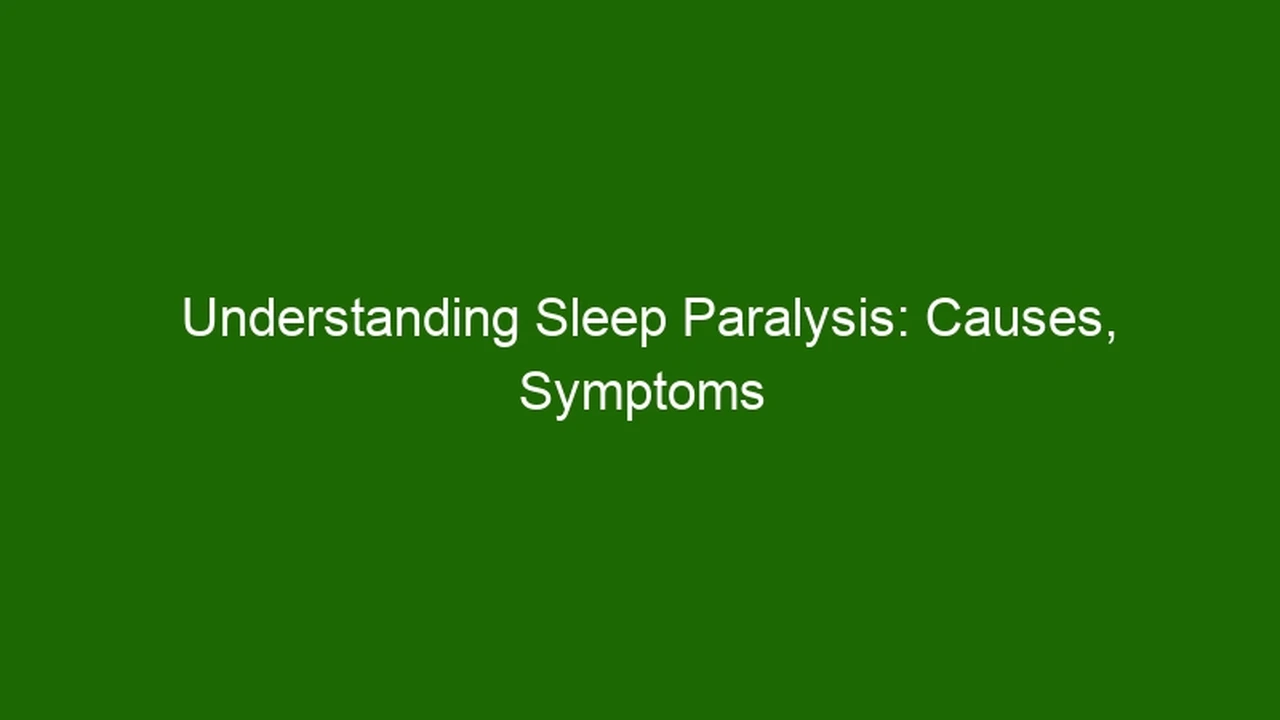Sleep Paralysis: Understanding the Causes and Symptoms
Sample meta description.

What Exactly IS Sleep Paralysis? Understanding the Sleep Paralysis Phenomenon
Okay, let's dive right into it. Sleep paralysis – it's that freaky feeling when you wake up, or are about to fall asleep, and you can't move a muscle. Like, totally frozen. It usually lasts for a few seconds or minutes, but trust me, it feels like an eternity when you're in it. It's often accompanied by some seriously weird hallucinations. Think shadows, whispers, a feeling of someone or something pressing down on you. Not exactly a pleasant way to start or end your sleep cycle, right?
The Science Behind the Freeze: REM Sleep and Sleep Paralysis Causes
So, what's actually going on? Well, during REM (Rapid Eye Movement) sleep, your brain is super active – that's when you dream. To prevent you from acting out your dreams (imagine punching your spouse in your sleep!), your body is temporarily paralyzed. Sleep paralysis happens when you become aware during this transition period. Basically, your brain wakes up, but your body's still in sleep mode. Think of it like a system glitch in your brain-body connection.
Sleep Paralysis Symptoms: Recognizing the Signs and Hallucinations
The main symptom is, of course, the inability to move. But it's usually more than just that. People often experience a feeling of dread, fear, or anxiety. Then there are the hallucinations. These can be visual (seeing shadows or figures), auditory (hearing whispers or noises), or tactile (feeling pressure on your chest). Some people even report feeling like they're floating or levitating. It's different for everyone, but it's almost always terrifying. The key symptom is the disconnect between your conscious awareness and your body's ability to move.
Common Sleep Paralysis Causes and Risk Factors
There's no single cause, but several factors can increase your risk. Stress and anxiety are big ones. Irregular sleep schedules (like pulling all-nighters and then sleeping in on weekends) can throw your sleep cycle off. Sleeping on your back seems to make it more likely for some people. Certain medications and underlying sleep disorders, like narcolepsy or sleep apnea, can also contribute. Even genetics might play a role. Basically, if you're already prone to sleep problems, you might be more vulnerable.
Diagnosing Sleep Paralysis: When to See a Doctor
If you experience sleep paralysis only occasionally, it's probably nothing to worry about. But if it's happening frequently, causing you significant distress, or interfering with your daily life, it's time to see a doctor. They can rule out any underlying medical conditions and recommend strategies to manage it. A sleep study might be necessary to diagnose other sleep disorders that could be contributing.
Sleep Paralysis Treatment Options and Prevention Strategies
There's no magic cure, but there are things you can do to manage sleep paralysis. Improving your sleep hygiene is crucial. That means sticking to a regular sleep schedule, creating a relaxing bedtime routine, and making sure your bedroom is dark, quiet, and cool. Managing stress and anxiety through techniques like meditation or yoga can also help. If you have an underlying sleep disorder, treating that is essential. Cognitive Behavioral Therapy for Insomnia (CBT-I) can also be beneficial. Avoiding sleeping on your back might reduce the frequency of episodes.
The Role of Sleep Position and Sleep Paralysis Frequency
As mentioned earlier, sleep position can play a role. Studies suggest that sleeping on your back, known as the supine position, may increase the likelihood of experiencing sleep paralysis. This is thought to be due to the way your body weight distributes and potentially affects breathing patterns during sleep. Experimenting with sleeping on your side (either left or right) might be a simple yet effective way to reduce the frequency of these episodes.
Stress Management Techniques and Their Impact on Sleep Quality
Stress is a notorious sleep disruptor, and it's often linked to increased instances of sleep paralysis. Implementing effective stress management techniques can significantly improve your sleep quality and potentially reduce these episodes. Consider incorporating practices like mindfulness meditation, deep breathing exercises, or yoga into your daily routine. Even dedicating just 15-20 minutes each day to these activities can make a noticeable difference. Think of it as preventative maintenance for your sleep cycle.
The Link Between Anxiety Disorders and Sleep Paralysis Experiences
Anxiety disorders, such as generalized anxiety disorder (GAD) or panic disorder, can exacerbate sleep paralysis. The heightened state of anxiety can disrupt your sleep architecture and make you more susceptible to these episodes. If you suspect you have an anxiety disorder, seeking professional help from a therapist or psychiatrist is crucial. They can provide you with strategies to manage your anxiety, which in turn, can positively impact your sleep.
Medications and Their Potential Effects on Sleep Paralysis
Certain medications, particularly those that affect the central nervous system, can potentially trigger or worsen sleep paralysis. Antidepressants, especially selective serotonin reuptake inhibitors (SSRIs), have been associated with increased instances of sleep paralysis in some individuals. If you're taking medication and experiencing frequent episodes, talk to your doctor. They can evaluate whether the medication could be contributing and explore alternative options if necessary. Never stop taking medication without consulting your doctor first.
Underlying Sleep Disorders and the Connection to Sleep Paralysis
Sleep disorders like narcolepsy and obstructive sleep apnea are often associated with sleep paralysis. Narcolepsy, a neurological disorder that affects the brain's ability to control sleep-wake cycles, is a well-known risk factor. Obstructive sleep apnea, a condition where breathing repeatedly stops and starts during sleep, can also disrupt sleep architecture and increase susceptibility. If you suspect you have either of these conditions, a sleep study is essential for diagnosis and treatment.
Creating a Relaxing Bedtime Routine for Better Sleep and Reduced Sleep Paralysis
Establishing a consistent and relaxing bedtime routine can significantly improve your sleep quality and potentially reduce the occurrence of sleep paralysis. This routine should start about an hour or two before you plan to go to bed. Avoid screens (phones, tablets, computers) during this time, as the blue light emitted can interfere with melatonin production, a hormone that regulates sleep. Instead, engage in relaxing activities like reading a book, taking a warm bath, or listening to calming music. Consistency is key – try to follow the same routine every night, even on weekends.
The Importance of a Consistent Sleep Schedule for Preventing Sleep Paralysis
Maintaining a consistent sleep schedule is one of the most important things you can do to prevent sleep paralysis. Going to bed and waking up at the same time every day, even on weekends, helps regulate your body's natural sleep-wake cycle, known as the circadian rhythm. This consistency can improve your sleep quality and reduce the likelihood of sleep disruptions that can trigger sleep paralysis. Think of your circadian rhythm as an internal clock – keeping it synchronized is crucial for optimal sleep.
Sleep Paralysis and Lucid Dreaming: Exploring the Connection
Interestingly, there's a connection between sleep paralysis and lucid dreaming. Lucid dreaming is when you become aware that you're dreaming while you're still in the dream. Some people intentionally induce sleep paralysis as a gateway to lucid dreaming. By remaining calm and focused during the paralysis, they can transition into a lucid dream. However, this technique isn't for everyone, and it's important to approach it with caution, especially if you have a history of anxiety or panic attacks.
Product Recommendations to Improve Sleep Quality and Reduce Sleep Paralysis
Let's talk about some products that might help improve your sleep and potentially reduce the frequency of sleep paralysis. Remember, these aren't cures, but they can contribute to a better sleep environment and overall sleep hygiene.
Weighted Blankets for Anxiety Relief and Deeper Sleep
Product: Gravity Blanket
Use Case: Weighted blankets provide a gentle, calming pressure that can help reduce anxiety and promote relaxation, leading to deeper sleep. They're particularly helpful if your sleep paralysis is triggered by stress or anxiety.
Comparison: Gravity Blanket is a popular brand, but alternatives like YnM Weighted Blanket and Luna Weighted Blanket offer similar benefits at varying price points. Consider the weight of the blanket (usually 10% of your body weight) and the material (cotton, bamboo, etc.) when choosing.
Price: Gravity Blanket ranges from $200-$300 depending on size and weight. Alternatives can be found for $80-$150.
White Noise Machines for Blocking Out Disturbances
Product: LectroFan White Noise Machine
Use Case: White noise machines create a consistent, ambient sound that can mask distracting noises and help you fall asleep and stay asleep. They're great if you live in a noisy environment or are easily awakened by sounds.
Comparison: LectroFan is a top-rated option, but alternatives like Marpac Dohm and Sound+Sleep Mini offer similar functionality. Consider the range of sounds offered, the volume control, and the portability of the machine.
Price: LectroFan ranges from $50-$80. Alternatives can be found for $30-$100.
Sleep Masks for Blocking Out Light
Product: Manta Sleep Mask
Use Case: Sleep masks block out light, which is essential for melatonin production and a good night's sleep. They're particularly helpful if you live in an area with streetlights or if your bedroom isn't completely dark.
Comparison: Manta Sleep Mask is known for its comfortable and customizable design, but alternatives like Alaska Bear Natural Silk Sleep Mask and Bedtime Bliss Contoured Sleep Mask offer good light blockage at a lower price. Consider the material, the adjustability, and the comfort of the mask.
Price: Manta Sleep Mask ranges from $30-$40. Alternatives can be found for $10-$20.
Aromatherapy Diffusers for Relaxation
Product: Vitruvi Stone Diffuser
Use Case: Aromatherapy diffusers release essential oils into the air, creating a relaxing and calming atmosphere that can promote sleep. Lavender, chamomile, and cedarwood are popular essential oils for sleep.
Comparison: Vitruvi Stone Diffuser is a stylish and effective option, but alternatives like URPOWER Essential Oil Diffuser and InnoGear Essential Oil Diffuser offer similar functionality at a lower price. Consider the size of the diffuser, the runtime, and the design.
Price: Vitruvi Stone Diffuser ranges from $120-$150. Alternatives can be found for $20-$50.
Mattress Toppers for Enhanced Comfort
Product: Tempur-Pedic TEMPUR-Adapt + Cooling Mattress Topper
Use Case: A comfortable mattress is crucial for good sleep. If your mattress is old or uncomfortable, a mattress topper can provide added support and cushioning, leading to a more restful night.
Comparison: Tempur-Pedic is a premium brand known for its memory foam, but alternatives like Linenspa 3 Inch Gel Infused Memory Foam Mattress Topper and LUCID 3 Inch Ventilated Gel Memory Foam Mattress Topper offer similar comfort at a more affordable price. Consider the thickness, the material, and the cooling properties of the topper.
Price: Tempur-Pedic toppers range from $200-$400. Alternatives can be found for $80-$200.
Smart Sleep Trackers for Monitoring Sleep Patterns
Product: Fitbit Sense
Use Case: Smart sleep trackers monitor your sleep patterns, including sleep stages, heart rate, and movement. This data can help you identify potential sleep problems and make adjustments to your sleep routine.
Comparison: Fitbit Sense is a comprehensive tracker, but alternatives like Apple Watch Series 7 and Oura Ring offer similar features. Consider the accuracy of the tracking, the battery life, and the design.
Price: Fitbit Sense ranges from $250-$300. Alternatives can be found for $200-$400.
:max_bytes(150000):strip_icc()/277019-baked-pork-chops-with-cream-of-mushroom-soup-DDMFS-beauty-4x3-BG-7505-5762b731cf30447d9cbbbbbf387beafa.jpg)





: Symptoms and Risks.webp)
